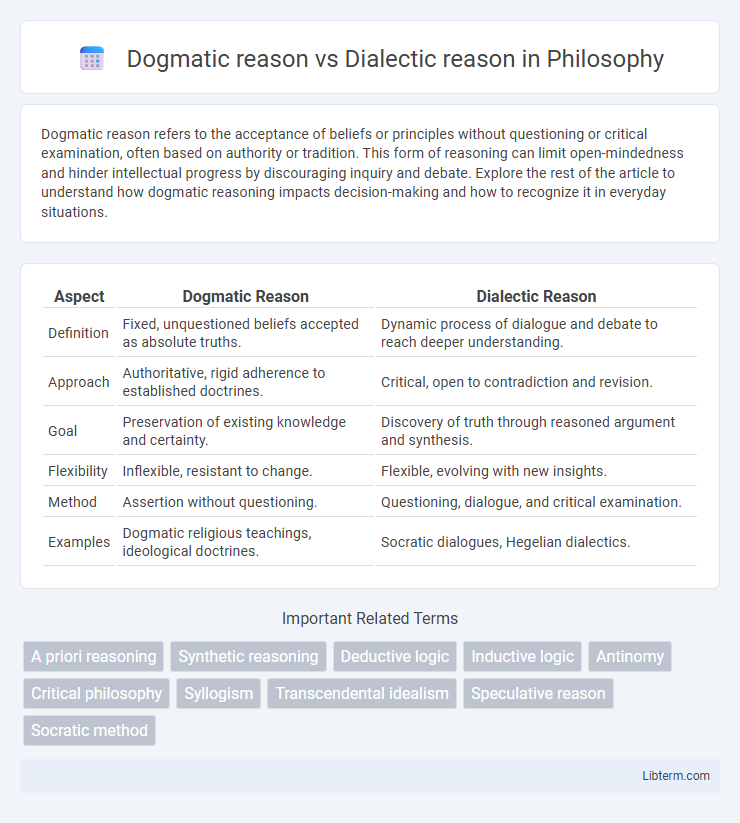Dogmatic reason refers to the acceptance of beliefs or principles without questioning or critical examination, often based on authority or tradition. This form of reasoning can limit open-mindedness and hinder intellectual progress by discouraging inquiry and debate. Explore the rest of the article to understand how dogmatic reasoning impacts decision-making and how to recognize it in everyday situations.
Table of Comparison
| Aspect | Dogmatic Reason | Dialectic Reason |
|---|---|---|
| Definition | Fixed, unquestioned beliefs accepted as absolute truths. | Dynamic process of dialogue and debate to reach deeper understanding. |
| Approach | Authoritative, rigid adherence to established doctrines. | Critical, open to contradiction and revision. |
| Goal | Preservation of existing knowledge and certainty. | Discovery of truth through reasoned argument and synthesis. |
| Flexibility | Inflexible, resistant to change. | Flexible, evolving with new insights. |
| Method | Assertion without questioning. | Questioning, dialogue, and critical examination. |
| Examples | Dogmatic religious teachings, ideological doctrines. | Socratic dialogues, Hegelian dialectics. |
Understanding Dogmatic Reason: Definition and Characteristics
Dogmatic reason is defined by its reliance on fixed, unquestionable beliefs or principles often accepted without critical examination. This form of reasoning emphasizes absolute truths and resists change, valuing certainty over exploration. Its characteristics include rigidity, a lack of openness to alternative perspectives, and a tendency to uphold established doctrines as incontrovertible.
Exploring Dialectic Reason: Meaning and Key Features
Dialectic reason involves critical thinking that examines opposing ideas through dialogue to uncover truth and resolve contradictions. It emphasizes questioning assumptions, engaging in reasoned argumentation, and adapting beliefs based on evidence and logical analysis. Key features include reflective skepticism, iterative reasoning, and an openness to revision, contrasting with dogmatic reason's rigid adherence to fixed beliefs.
Historical Evolution of Dogmatic and Dialectic Reason
Dogmatic reason has its roots in classical philosophy, prominently shaped by Aristotle's emphasis on fixed principles and absolute truths, reinforcing a prescriptive approach to knowledge. Dialectic reason evolved through Socratic dialogue and Hegelian philosophy, prioritizing dynamic, argumentative processes and the synthesis of contradictory ideas to advance understanding. This historical evolution reflects a shift from static acceptance of doctrines to active engagement with ideas, influencing modern epistemology and critical thinking frameworks.
Core Principles: Dogmatism Versus Dialectics
Dogmatic reason relies on fixed, authoritative principles that resist change and emphasize absolute truths, often discouraging questioning or alternative perspectives. Dialectic reason, rooted in the Socratic method and Hegelian philosophy, prioritizes the synthesis of contradictory ideas through dialogue, fostering dynamic understanding and adaptability. Core principles of dogmatism center on unwavering certainty, while dialectics embrace contradiction and continual evolution of knowledge.
The Role of Authority in Dogmatic Reason
Dogmatic reason relies heavily on the unquestioned authority of established beliefs, often anchored in religious, cultural, or institutional sources, which limits critical inquiry and intellectual flexibility. Authority in dogmatic reason serves as the ultimate reference point, where arguments are accepted based on their origin rather than empirical evidence or logical analysis. This contrasts sharply with dialectic reason, which encourages continuous questioning, debate, and revision of ideas based on reasoned argumentation and evidence.
Critical Dialogue: Central to Dialectic Reason
Critical dialogue serves as the foundation of dialectic reason by fostering open-ended inquiry and the systematic examination of opposing viewpoints. Unlike dogmatic reason, which rigidly adheres to fixed principles without questioning, dialectic reason emphasizes reflective skepticism and the synthesis of ideas through argumentation. This dynamic process enhances understanding and drives intellectual progress by challenging assumptions and refining beliefs.
Advantages and Limitations of Dogmatic Thinking
Dogmatic reason offers clear, consistent, and stable frameworks by adhering firmly to established beliefs, which can provide certainty and decisiveness in complex situations. However, dogmatic thinking limits intellectual flexibility and critical inquiry, often leading to resistance against new evidence or alternative perspectives. This rigidity can hinder problem-solving and adaptation in dynamic or evolving contexts where dialectic reasoning encourages synthesis and growth.
Benefits and Challenges of Dialectic Reasoning
Dialectic reasoning promotes critical thinking by encouraging the examination of opposing viewpoints, which helps in uncovering deeper truths and fostering intellectual flexibility. This method enhances problem-solving skills and supports collaborative dialogue, making it valuable in academic and philosophical contexts. Challenges of dialectic reasoning include the potential for prolonged debate without resolution and the requirement of open-mindedness, which can be difficult for individuals with fixed or dogmatic beliefs.
Dogmatic vs Dialectic Reason in Modern Philosophical Debates
Dogmatic reason asserts fixed, unquestionable truths, often resisting new evidence, while dialectic reason embraces dialogue, critical questioning, and the synthesis of opposing ideas to uncover deeper understanding. In modern philosophical debates, dogmatic reason is frequently critiqued for rigidity and epistemic closure, whereas dialectic reason is valued for fostering open inquiry and dynamic resolution of conceptual conflicts. The tension between dogmatic certainty and dialectic openness shapes contemporary discussions in epistemology, ethics, and political philosophy.
Practical Applications: Choosing Between Dogmatic and Dialectic Reason
Dogmatic reason relies on fixed principles and unquestioned beliefs, making it suitable for environments requiring consistency and adherence to established rules, such as legal systems or organizational policies. Dialectic reason involves critical questioning and dialogue, promoting adaptability in complex problem-solving scenarios like conflict resolution or scientific research. Selecting between dogmatic and dialectic reason depends on the context's need for stability versus flexibility in decision-making processes.
Dogmatic reason Infographic

 libterm.com
libterm.com